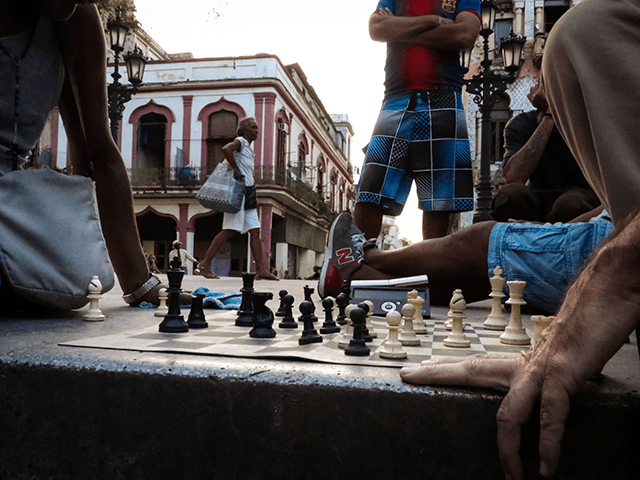Arián González Pérez, a grandmaster ranked by the International Chess Federation, has been on a hunger strike for three days as of Wednesday following his imprisonment for participating in peaceful protests in Cuba on July 11.
González, a Cuban who initially fled communism in his country and relocated to Spain, has been a vocal critic of the Castro regime for years. He is a Spanish citizen, but the Castro regime considers all persons born in Cuba – and ethnic Cubans abroad, regardless of them ever having been to Cuba – Cuban citizens only, meaning González will likely not have access to Spanish embassy services or protection. In addition to his status as a chess champion, González is an attorney and has used his position to advocate for freedom in Cuba. Reports indicate that he returned to Cuba this month, despite the threat presented by being in the country having criticized the regime in the past, to care for his mother, who is suffering from diabetes.
He reportedly participated in peaceful marches in his native Villa Clara, along with thousands of Cubans who have engaged in daily protests since July 11 calling for an end to the regime. The protests spanned nearly every major city in the country and prompted a wave of violent repression that has included public gang beatings of protesters, police opening fire on unarmed crowds, and enforced disappearances of minors.
On Wednesday, the mothers of the disappeared on July 11 – believed to be in the thousands, though human rights agencies have only verified nearly 600 arrests – organized nationwide marches demanding to know what the state did to their children. Again, Cuban State Security agents responded with violence, arrested several organizers of the event and journalists in Havana who intended to report on the protests. The Castro regime shut down internet access shortly after the initial wave of protests, forcing Cubans to resort to unreliable VPNs and smuggling tactics to share news of regime repression with the world.
González’s partner, who outlets identified only as Massiel, confirmed his hunger strike to the Spanish newswire agency EFE on Wednesday, stating that he would remain on a hunger strike “until his health permits.” She also confirmed that police had charged the 32-year-old attorney with “pubic disorder” and “incitement to the masses,” political crimes in Cuba. Cuban police have not allowed González access to visitors in prison at press time.
The Spanish Federation of Chess issued a statement last week confirming González’s arrest.
“We have immediately contacted the Superior Council of Sports and the Cuban Chess Federation seeking information over the situation regarding the grand master in question,” the statement read in part. “The Spanish Federation of Chess wishes to see the situation clarified as soon as possible and immediate freedom for Arián González Pérez.”
Fellow Cuban Grandmaster Leinier Domínguez issued a statement on Wednesday in defense of his colleague, asserting that González was, “in addition to a brilliant and talented chess player, an excellent person” who had no business being in prison. In an extended Facebook post, Domínguez, writing from the United States, described the Cuban government as “a macabre thing.”
“The famous Revolution and its leaders received a status above human beings, it presents itself like something divine, something beyond all ordinary consideration,” Domínguez wrote. “This, of course, ignores that the nature of human beings is not good and all governments of men will have greater or lesser problems.”
“The logical conclusion of this ideology is that no one has any right to think differently and they use power to literally crush (in the name of the just and infallible revolutionary cause) anyone opposed,” he concluded.
González had faced challenges to returning to Cuba after his departure to Spain, in part because he had abandoned the Cuban Chess Federation.
“Chess in Cuba is part of the Cuban government’s political monopoly. As in many other fields, this is a means for young people to be able to have the aspiration of leaving the Island and search for a better future,” González said in an interview with the independent Cuban outlet 14 y Medio in 2015. “But many do not do it because chess at the world level is a poor sport while the Cuban government gives the Grand Masters a salary of 100 CUC [a month] which is high in comparison with the rest of the population.”
For comparison, Cuba raised the salaries of specialist doctors in 2014 to $67 a month. The CUC, or Cuban Convertible Peso, was a parallel currency artificially pegged to the dollar recently eliminated from circulation. The Cuban peso is worth significantly less; Cuba used the CUC system for decades to keep Cuban citizens out of the country’s most luxurious hotels, shops, and other tourist destinations.
Cuba similarly uses other sports – most prominently baseball and Olympic boxing, among others – to generate income while trapping athletes in prohibitive contracts that control their lives and travel. The policy regularly results in high-profile athlete defections.

COMMENTS
Please let us know if you're having issues with commenting.